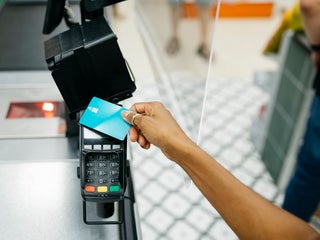Summary
Lots of U.S. children have access to credit cards, according to a new CreditCards.com poll. Hear experts’ opinions on whether that’s a good idea or not.
The content on this page is accurate as of the posting date; however, some of our partner offers may have expired. Please review our list of best credit cards, or use our CardMatch™ tool to find cards matched to your needs.
Six million American parents have at least one child with their own credit card, according to a new CreditCards.com poll.
But surprising as that figure may be, it’s far more common for children to have their own cellphones.
In our survey, 8 percent of U.S. parents with children under 18 said at least one of those kids has a credit card. Meanwhile, more than half (53 percent) said they have children with their own mobile phones.
Children under 18 can’t apply for their own credit cards, but they can be added to their parents’ card accounts as authorized users, depending on the issuer’s rules.
There are lots of reasons to give a child a credit card before he or she turns 18 – they can get a head start in building credit and learn how to manage their finances. But they can also make unauthorized purchases and damage the parent’s credit.
Read on to find out what experts say about the pros and cons and how best to manage your child’s relationship with credit.
Children with credit cards poll: key findings
Here are some other major findings from our children with credit cards poll:
- 21 percent of parents who have credit cards said their children used them without their permission at least once: That figure doesn’t change much by age – 20 percent of those 14 and under, 19 percent of those 12 and under, 18 percent of those 10 and under and 17 percent of those 8 and under have used their parent’s credit card without their parent knowing.
- Children are more likely to have credit cards if their parents make more money: 13 percent of parents who make more than $80,000 have a credit-card-carrying child, compared to 9 percent in the $40,000-$80,000 range and 5 percent in the under-$40,000 category.
- Children in the Northeast are most likely to carry credit cards: 13 percent of children with credit cards live in the Northeast, 8 percent live in the South and West and 5 percent in the Midwest.
The survey of 1,524 U.S. adults was conducted online between Feb. 26 and March 1, 2019. See survey methodology
On children using cards without permission
Psychotherapist Debra L. Kaplan said one of the greatest changes to an adolescent’s life is their new and growing relationship to money and spending.
And parents must teach children limits on any behavior, including access to credit cards, cellphones and other devices that enable online payments.
“In this digital age, it’s easier for children to use credit cards without permission because there is no tangible connection to a credit card when it is loaded into a website for ease of access purchasing,” Kaplan said.
So you really need to be monitoring your child’s cellphone use, especially if you’ve stored credit card information on there.
Scott Butler, financial planner at Klauenberg Retirement Solutions, said he often hears people talking about how you are not legally responsible for unauthorized charges, including those made by your own children.
That might be so in certain situations, even though many credit card companies are likely to do everything that they can to collect anyway.
But, Butler added, it’s quite common in these situations for the parent to feel at least some degree of guilt and responsibility for charges, even if they are unauthorized.
“Teaching your child about the proper uses of credit — perhaps by giving them their own credit card — will reduce the likelihood that your child makes unauthorized purchases,” Butler said.
Although parents are generally not liable for unauthorized purchases made by their children, the parent can use this as a teachable moment and pay for the purchase, said Kassandra T. Dasent, personal finance consultant.
More extreme measures may be warranted if your child repeatedly uses your card without permission or steals it from your wallet.
“The tough love approach in a severe situation would be to file a report with the police and open a case with the credit card company, in order to prove that the charges were indeed not authorized and theft was involved,” Dasent said.
See related: 6 questions to ask when adding an authorized user to your card
Children with credit cards: The pros
Many experts agree it’s a good thing to give a child a credit card.
One advantage is that it provides a new opportunity for parents to teach children about responsible spending.
Kaplan feels giving a child a physical card is the best way to go.
“Because children with cellphones are now exposed to the concept of payments via digital wallets, the physical presence of a card might actually help a child understand the value of money since digital and virtual currency removes that fine connection to permanence,” Kaplan said.
And Butler said the greatest benefit of giving a credit card to your child is the opportunity it provides to teach them about good credit behaviors and the dangers that go along with using credit.
“You will need to take the time to walk your child through bills, pointing out things like APR and finance charges. Ideally, you will start your child off with a low credit limit, which you can increase over time as he or she shows they are ready for more responsibility,” Butler said.
He also recommends parents monitor their child’s credit card usage and review it with them.
There should be clear consequences to go along with rules about when and what purchases are acceptable to make with the card, he added. You should also set up a way for your child to take responsibility for making payments, even if the bills are not paid with their money.
As long as giving your kid a credit card comes with educating them on how to use one responsibly, then it could help them out later in life, said James Garvey, CEO and co-founder of the website Self Lender.
“After all, not only do they get the financial education to use their money responsibly and mindfully as an authorized user on your account, they also get to start building credit history sooner rather than later,” Garvey said.
If your child is an authorized user on your card account, it can help him or her get an early start on building a credit history. However, you may want to check with your card issuer to find out if it will report your child’s authorized user account to the credit bureaus (some issuers don’t).
Keep in mind that if you don’t use your credit responsibly, then it could hurt your child’s credit history, rather than help, Garvey warned.
Jacqueline Devereux, credit and financial expert at SproutCents, said another benefit to a child carrying a credit card is their having access funds in case of an emergency.
See related: What’s the minimum age to be an authorized user?
Children with credit cards: The cons
Some experts feel it’s not a good idea to give a child a credit card. Ellie Thompson, CEO of the website Money Therapy, thinks it’s potentially disastrous if your own credit history is troubled.
“If you aren’t using your credit card correctly and paying off debt every month, chances are you might teach your children that same behavior,” Thompson said.
If you don’t have a great track record with your credit card, do not allow your child to have one, she warned.
Most companies don’t allow you to set a specific spending limit for authorized users, so technically, a child could max out the credit card, said Priyanka Prakash, lending and credit expert at Fundera. This could hurt your credit score and your child’s.
“I would recommend that parents talk with their kids about responsible credit usage before getting them a credit card. Also, you should first test the waters with a prepaid credit card that’s linked to a low-balance account,” Prakash said.
Andrew Schrage, CEO of Money Crashers, feels that giving a child a credit card is getting their financial education started off on the wrong foot by not teaching them the value of saving money and the long term benefits of compound interest.
“If you want to provide a child with something for emergency situations, then one option is to get a prepaid debit card he or she can use,” Schrage said.
See related: 6 tricks to juggle multiple credit card balances
Yea or nay?
Giving your child a credit card might be worthwhile if you closely monitor his or her usage.
Consider adding your child to a card that has a low limit, and make sure you track his or her spending. This way, you can teach your child good practices for responsible spending and managing credit card debt.
Ultimately, it’s up to you to decide, so weigh the pros and cons and make the choice that’s right for your family.
Survey methodology
CreditCards.com commissioned YouGov Plc to conduct the survey. All figures, unless otherwise stated, are from YouGov Plc. Total sample size was 1,524 adults with children under 18, including 1,074 who also have a credit card. The survey was conducted online from Feb. 26 to March 1, 2019. The figures have been weighted and are representative of all U.S. adults (ages 18 and older).
Editorial Disclaimer
The editorial content on this page is based solely on the objective assessment of our writers and is not driven by advertising dollars. It has not been provided or commissioned by the credit card issuers. However, we may receive compensation when you click on links to products from our partners.



